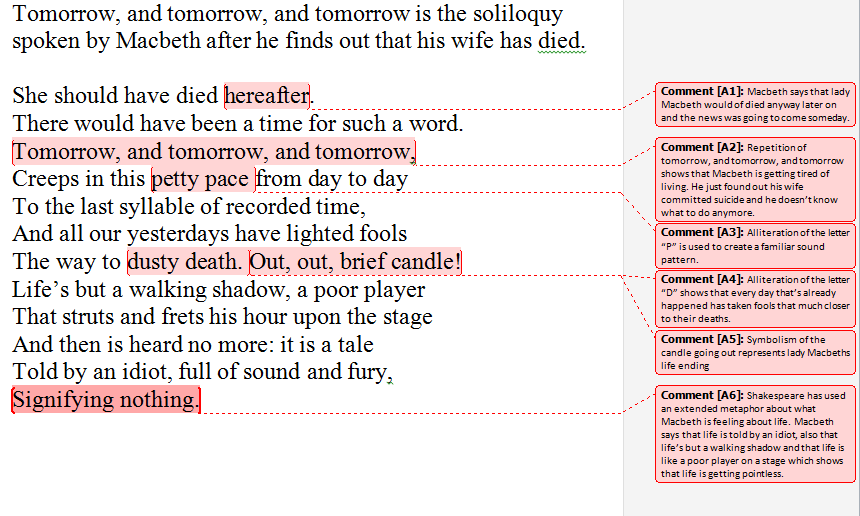
Annotation Of Macbeth Soliloquy Macbeth soliloquy
A comparison between the above soliloquy and Macbeth's previous soliloquies in 1.7 and 2.1 reveals a key change in his character. Macbeth is again contemplating murder, but what impels his deliberation this time is not guilt and shame but panic and rage. The murder of Duncan has made the murder of Banquo a necessity and, more importantly to.
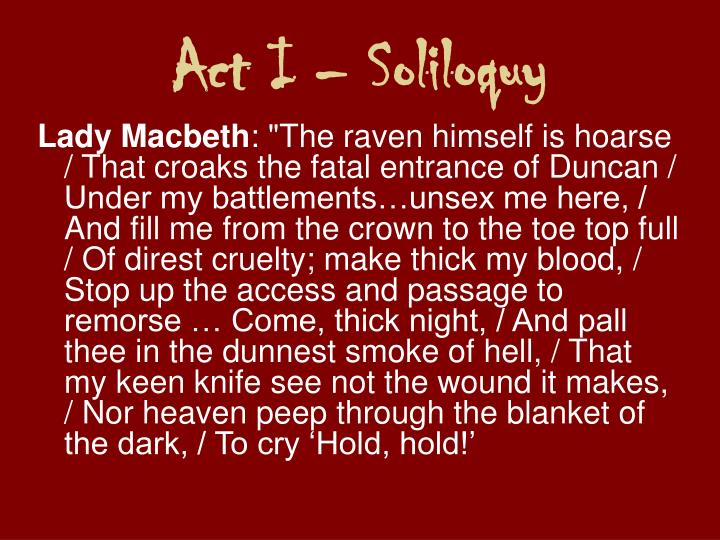
PPT MACBETH PowerPoint Presentation ID1279262
Soliloquies in Macbeth What is the importance of soliloquies in Macbeth? Soliloquy is a literary device used in drama when a character wants to speak to him or herself. The main purpose of soliloquies is to express the feelings, inner thoughts, personality and mind set of the characters.
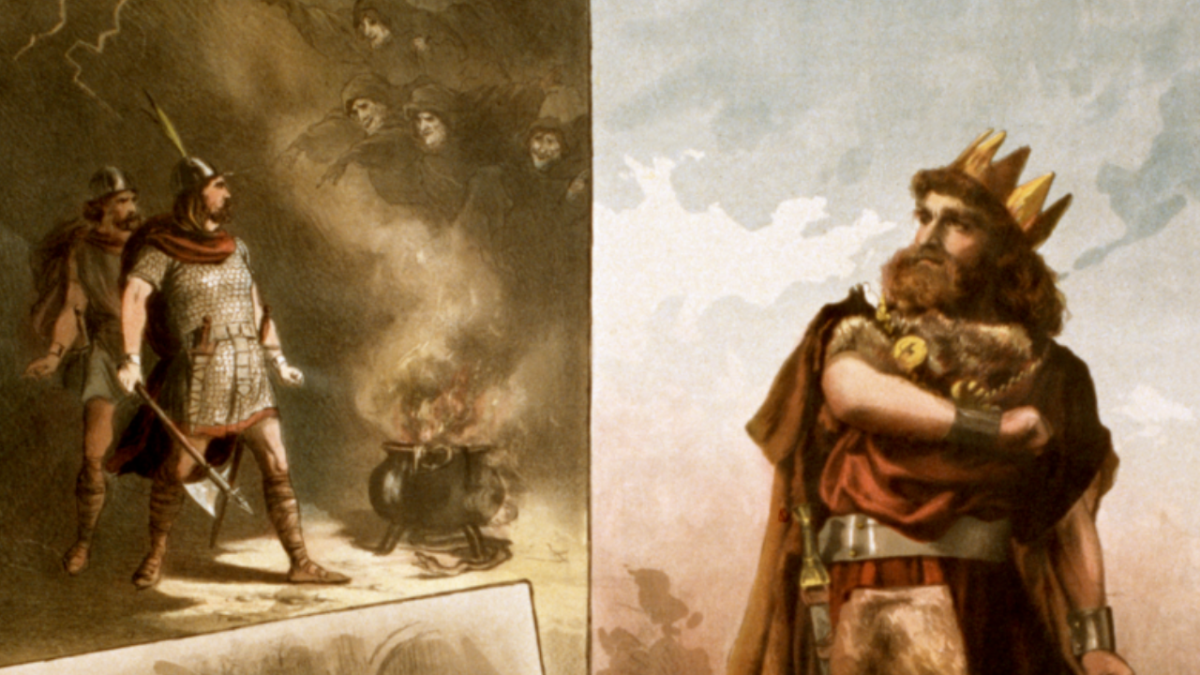
Macbeth's Seven Soliloquies Listed and Explained Owlcation
Macbeth's Soliloquy: If it were done when 'tis done. (1.7.1-29) Annotations. If it were done when 'tis done, then 'twere well. It were done quickly: if the assassination. Could trammel up the consequence, and catch, With his surcease, success; that but this blow. Might be the be-all and the end-all here,
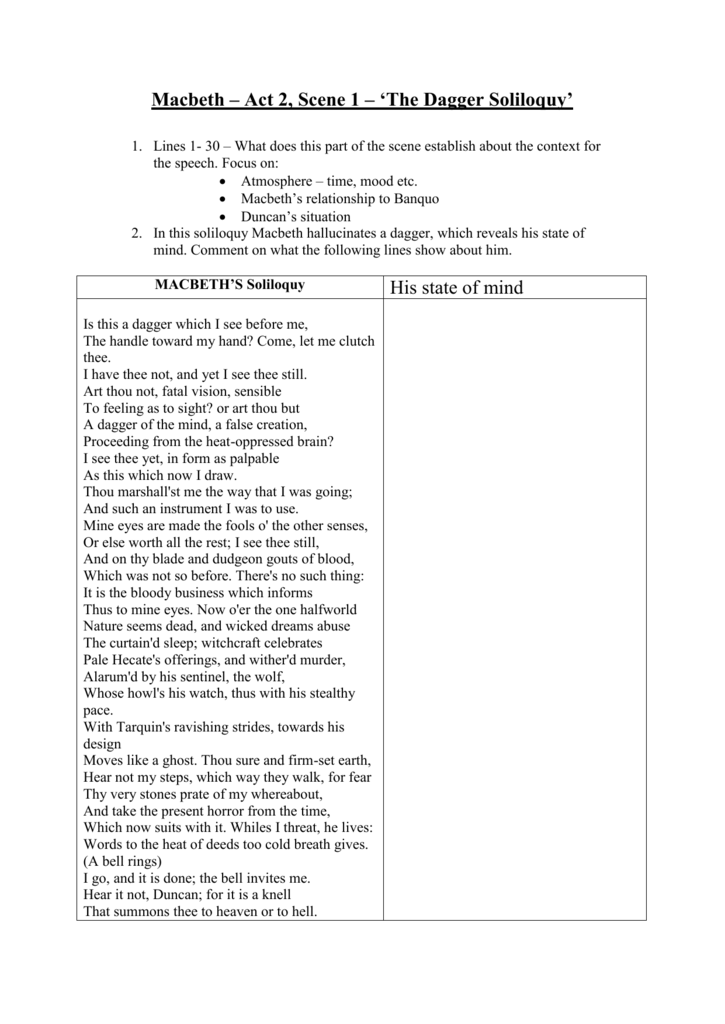
2.1 Macbeth The Dagger Soliloquy.doc
This page has only Macbeth monologues; you can find the top Macbeth soliloquies here. Not sure the difference between the two? Read this article. Monologue spoken by Sergeant Act 1, Scene 2: Doubtful it stood; As two spent swimmers, that do cling together And choke their art. The merciless Macdonwald. Worthy to be a rebel, for to that

Soliloquy in 'Macbeth' a detailed Analysis. GCSE English Marked by
Moves like a ghost. Thou sure and firm-set earth, Hear not my steps, which way they walk, for fear Thy very stones prate of my whereabout, And take the present horror from the time, Which now suits with it. Whiles I threat, he lives: Words to the heat of deeds too cold breath gives. A bell rings I go, and it is done; the bell invites me.
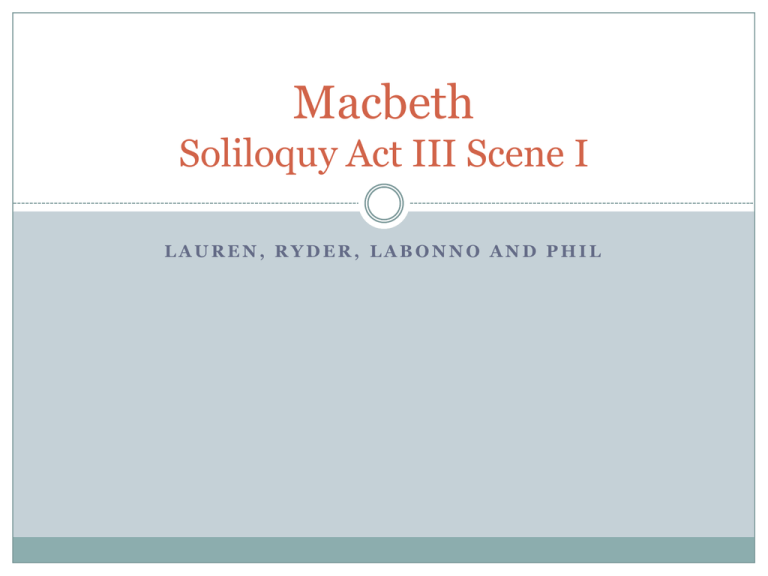
Macbeth Soliloquy Act III Scene I
Macbeth's Soliloquy: Is this a dagger which I see before me (2.1.33-61). Macbeth, after discussing the crime with Lady Macbeth, has decided to go through with the "terrible feat" (1.7.75). Now he sits alone, waiting for the bell which will summon him to murder Duncan, pondering his decision one final time.
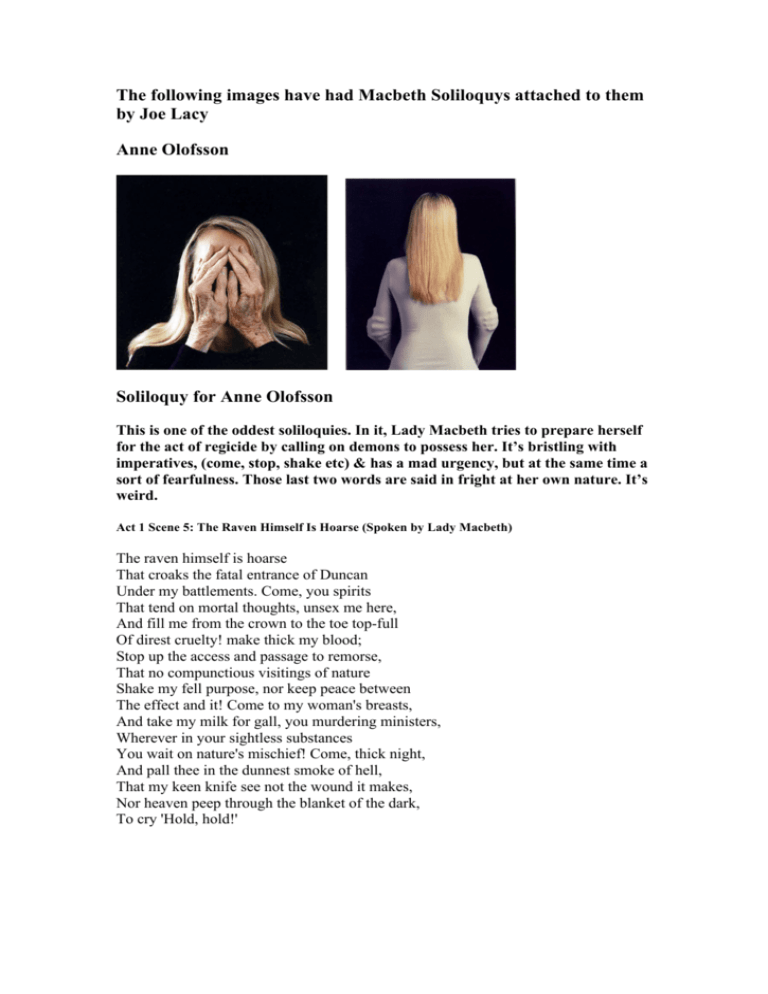
Macbeth Soliloquy images
Quick answer: There are seven soliloquies in Macbeth. There are two in act 1, scene 5; one in act 1, scene 7; one in act 2, scene 1; one act 2, scene 3; one in act 3, scene 1; and one in act 5,.

Soliloquy In Macbeth. Importance And Dramatic Significance Of Soliloquies In Shakespeare's
Here's Macbeth's soliloquy in full: She should have died hereafter; There would have been a time for such a word. Tomorrow, and tomorrow, and tomorrow, Creeps in this petty pace from day to day To the last syllable of recorded time, And all our yesterdays have lighted fools The way to dusty death. Out, out, brief candle!
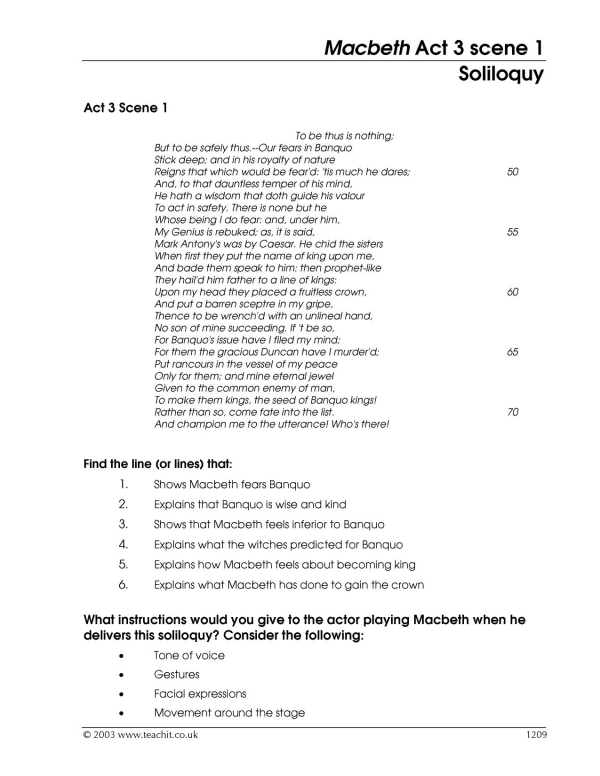
Exploring Macbeth's soliloquy in Act 3 Scene 1KS3 EnglishTeachit
Soliloquy in Macbeth - Soliloquies in the play Macbeth reflects its major characters' psyche when characteristically they are speaking to themselves and it reveals their inner conflicts and the working of their consciences.

Analysis of Macbeth soliloquy GCSE English Marked by
Macbeth Soliloquies In Modern English Home 1 / Shakespeare Quotes 2 / Shakespeare Soliloquies 3 / Macbeth Soliloquies In Modern English The soliloquies from Macbeth below are extracts from the full modern English Macbeth ebook, along with a modern English translation.
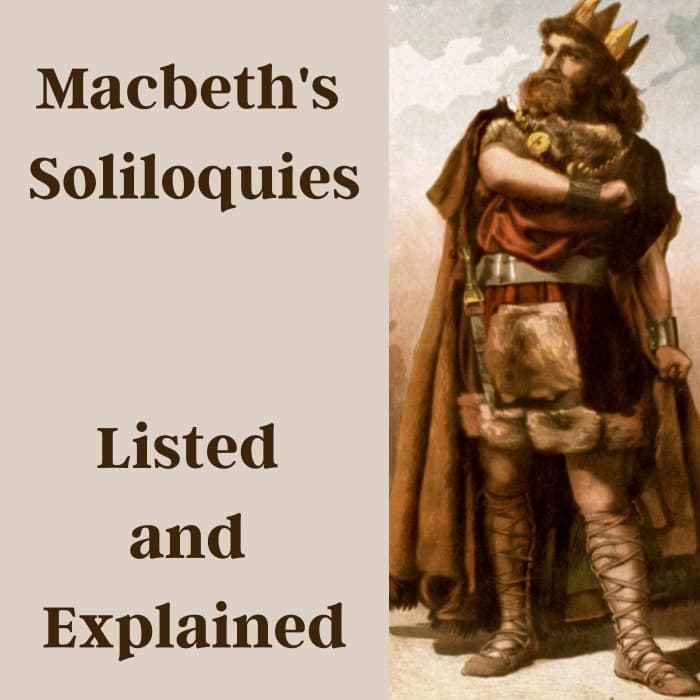
Macbeth's Seven Soliloquies Listed and Explained Owlcation
Shop 'Tomorrow, And Tomorrow, And Tomorrow' Soliloquy Analysis Home 1 / Shakespeare Quotes 2 / Shakespeare Soliloquies 3 / 'Tomorrow, And Tomorrow, And Tomorrow' Soliloquy Analysis Read Shakespeare's 'Tomorrow, and tomorrow, and tomorrow' soliloquy from Macbeth below with modern English translation and analysis, plus a video performance.
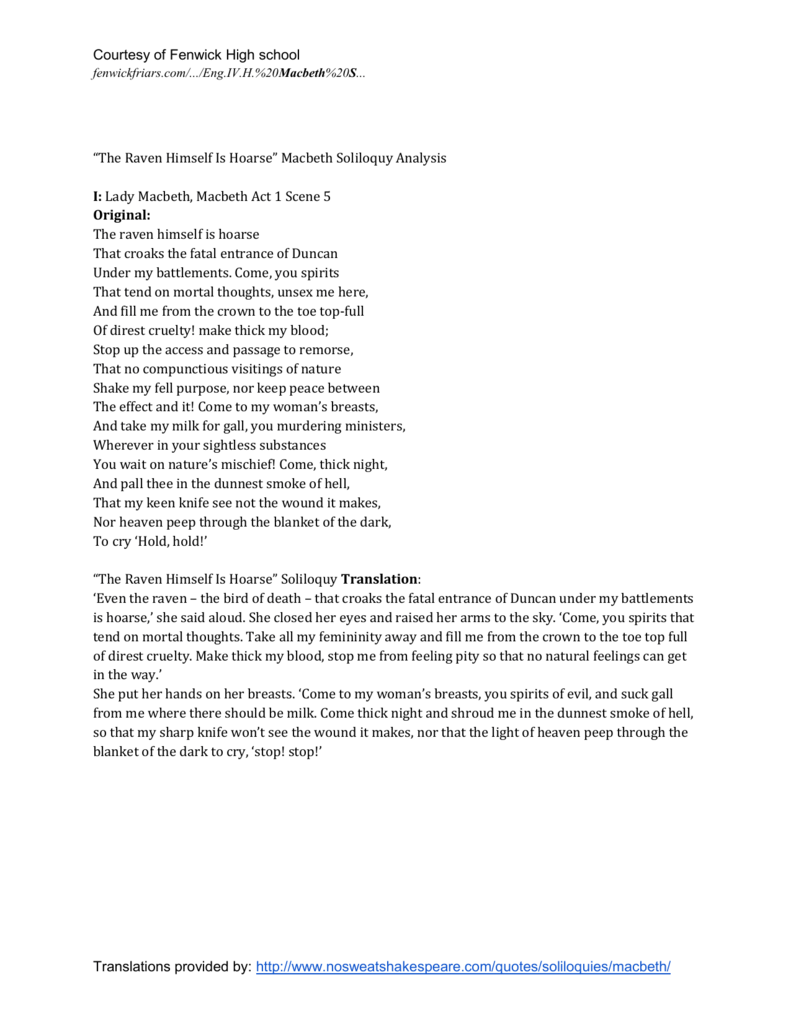
Macbeth Soliloquies Analysis Activity1
Critical Analysis: Soliloquies in Macbeth A soliloquy is a speech delivered by a character that reveals his or her innermost thoughts and feelings. It is unvarnished truth because the character is alone in his or her head. Soliloquies are central to the play because in them there is only truth. There is no deception as

Macbeth Act 5 scene 5 Macbeth's final soliloquy YouTube
(a) initially acutely aware of the difference between right and wrong and determined to listen to his conscience. (b) halluncinating daggers (c) paranoid and fearful that Banquo will destroy him (d) impulsive and perhaps not entirely sane when he decides to kill Macduff's wife and children
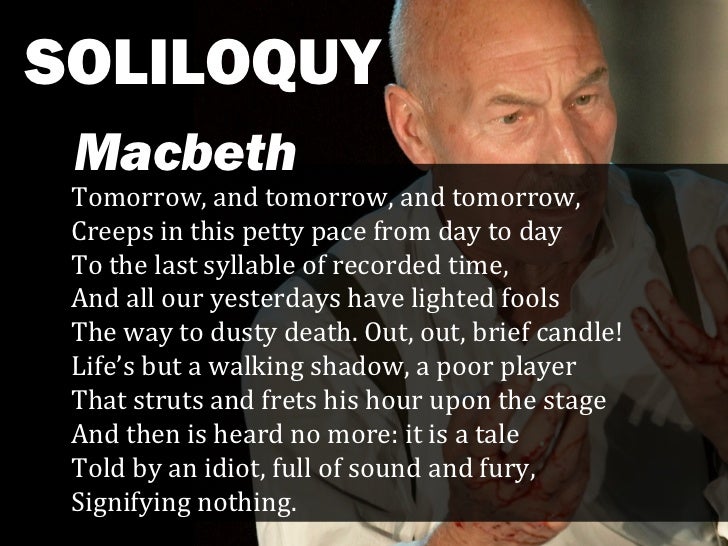
1 blankverseconceitsoliloquy
The seven soliloquies that Macbeth speaks span all five acts of the play. Act I, Scene 3, Present Fears: Why do I yield to that suggestion… Act I, Scene 7, Vaulting Ambition: He's here in double trust… Act II, Scene 1, The Dagger Speech: Is this a dagger which I see before me?
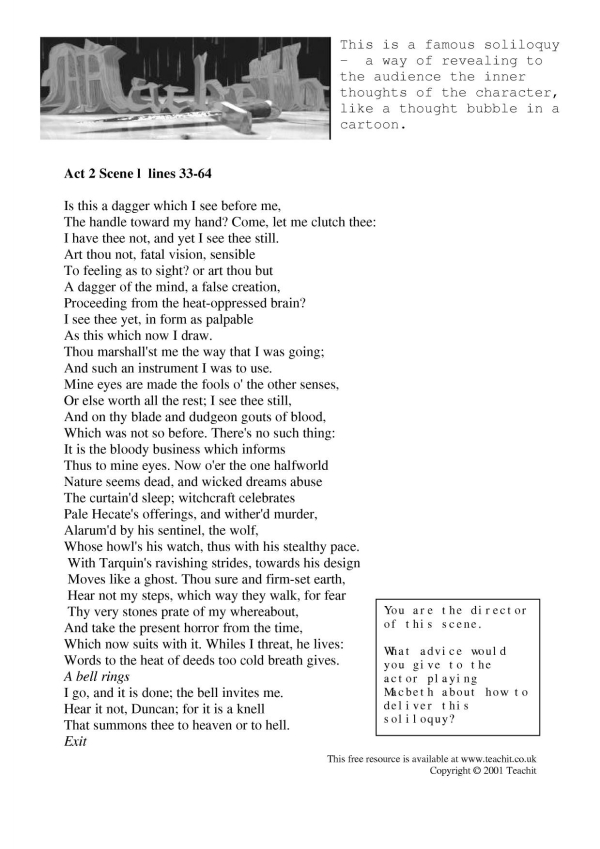
Directing A SoliloquyAct 2 Scene 1 of MacbethKS3 EnglishTeachit
So begins one of the most famous soliloquies in Shakespeare's Macbeth - indeed, perhaps in all of Shakespeare. Before we offer an analysis of this scene - and summarise the meaning of the soliloquy - here is a reminder of the famous speech. (If you would like an overview of the whole of Macbeth, we have analysed the play here .)

Macbeth's Seven Soliloquies Listed and Explained Owlcation
Soliloquies in Macbeth: An Analysis The soliloquies in Macbeth are not only of utmost importance because of its apparent lyrical quality, but they interweave the narrative beautifully and reveal the dilemma and motivation of the characters. Soliloquies in Act I Scene iii - Macbeth's first soliloquy after meeting the witches